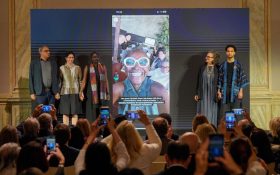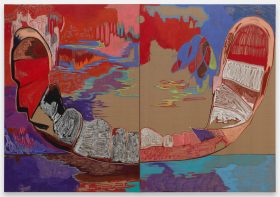Are you servicing the Old and New?
As Britain officially emerges out of an economic crisis in 2010, a new type of artistic entrepreneur has evolved.
Entrepreneurs and indeed artists, who had previously struggled to navigate the sometimes complicated world of the arts, are establishing their identities and brand.
They have found that new economically sound and paid opportunities are emerging. Recent restructures in the industry and operational reviews by old established institutions has resulted in a surprise victory for those who have been craving new voices.
This has been recently demonstrated by the Arts Council England’s (ACE) own internal HR re-shuffle; public consultation regarding provision and investment in the nationally funded Artists Taking the Lead project. The latter project is for the Cultural Olympiad in partnership with London 2012.
Other such initiatives include the work of Tom Goddard & Brian Watkins. They have been involved in a number of artist-led initiatives throughout Wales and are committed to debates and the strengthening of the cultural welfare of the region. They were part of the artist-led space Garej that exhibited 120 artists over a period of 15 months.
These types of exhibitions can be a catalyst for engaging new audiences, artists and ‘old’ organisations.The benefits include commissions for work, the sharing of networks and for cross pollination of ideas and approaches for artists and community groups.
The economic crisis started a process which caused a domino effect of change. Unlike in the noughties, innovation is no longer just another buzz word but a policy to be implemented for survival in the arts and quality, not quantity has become the solution.
The result has been new companies with realistic strategies, which are inspired by economic models from other sectors servicing the needs of established organisations. Two years of economic down-turn has allowed for this within an industry which unashamedly in certain disciplines excelled during the crisis, specifically established contemporary British artists whose work proved itself recession proof.
For those in the arts who did not benefit from a multi-million pound auction of their work during the recession, the slow economy did however permit them time for evaluation and to reassess practice and explore diverse entrepreneurial avenues to fund and market their work.
This was clearly needed after 2008. ACE announced in that year that it was cutting funding to 194 organisations, just before the recession took a full hold on the British economy. At the time ACE called it their “broadest and bravest” grant revision to date. Critics referred to it as a “bloody cull.”
Ever the optimist, I believe Aces’ actions led to the rise of the entrepreneur within the industry; a trend that has been unmissable across all industries over the past decade in the UK.
It has meant within the Arts that companies such as my own, Pickled Productions, are now solution providers of high quality cost-effective products that explore interesting modes of connecting with audiences through the use of art.
Other benefits from funding cuts included an increase in collaborations and the dissemination of knowledge. In addition processes and professional development programmes enabled practitioners to market their wares as entrepreneurs within various frameworks, whilst learning how to communicate in a single comprehensive voice to the general public.
Something else the often fast-paced noughties did not allow for was actual adequate time for the new or emerging art practitioner to explore, research and develop ideas. The utilisation of technology and the media to disseminate news, information and database collection occured with greater success.
During the slow period, smarter, simpler social technology and sites allowed many new artists and associated services to experiment, and raise their profile by being easily accessible to the general public.
They used social media platforms for crowd sourcing and funding, and encouraged the general public to participate and engage in artistic work. In some instances (i.e. by the uploading of photos of the general publics personal photo collections) pieces of art work were created by the online community to represent the collective imagination of an online community.
Two such instances of this includes young entrepreneur Tiffany Philippou, who left Bristol University several months ago, saw a role at Saatchi & Saatchi as her ‘dream job where I get to be creative’. The internship required candidates to create a Facebook group with as many members as possible in less than one month.
The only problem was she had enormous success, setting up Secret London, which is a forum where people share their favorite gems in London, be they cafes or music venues. It accumulated a fan base of 190,000 in two weeks. It is now being launched as its own stand-alone start-up and she no longer has time for the internship.
There is only one Facebook group more successful than Philippou and that’s Create an Art Installation – it consists of one million Lego men each representing a real person. The founder Adam Oppenheimer, also a Bristol Student had more than 240,000 people join his group and Lego representatives recently contacted him with the intention of making this curious dream a reality.
Trends like this have also been identified across the pond, predicted and profited on by entrepreneurs such as American, Mike Harrington, one of the Picnik founders, a company that re-edits photos (an idea inspired from a missive email sent from his friend Darrin Massena explaining why online photo editing was the space for them to attack together and provide a new service) and has just sold to Google for millions.
There is also the Australian company Hell Gallery, one of 50 independent galleries to have been invited to the Tate Modern’s arts festival No Soul for Sale. Britain’s national museum for contemporary art enlisted the services of a New York-based panel of artists and curators to hunt down the most exciting art initiatives around the world, from Prague to Shanghai. Within weeks they were knocking on Hell’s door.
Co-owner Jess Johnson said, ‘We were stunned when we got the invitation; it took a few days to sink in. It’s a once-in-a-lifetime opportunity.’ Hell which has been open just one day a week for the past two years quickly developed a strong following in the local creative scene, with bands and DJs, and plenty of dancing taking opening nights into the wee hours.
Jess states, ‘‘(we did) All these things that you’re not really supposed to do at art openings. But it makes people feel a lot more relaxed and people who aren’t necessarily from the art community come along to see a band or whatever.’ Artist Run Initiatives have long been offering alternatives to commercially driven galleries, and the past decade has had dozens springing up around Melbourne.
Thus, many new organisations and those already established are contributing to the economy and shedding the image of the starved artist. This trend is due to the rise of what could be described as ‘Individual Capitalism’, a form of business where the basic unit is the individual rather than the company.
The internet opens up opportunities for how people work – remotely or from home, from their phone, as a small firm– and this shifts away from ‘Corporation Man’ to ‘Individual Capitalist’ has gained enormous momentum. The recession has created many enforced Individual Capitalists in the form of freelance consultants, but many others are corporate refugees of their own choosing.
This was recently demonstrated to me whilst attending a course as apart of the Cultural Leadership Programme were many of the other successful practitioners could only be described as ‘Individual Capitalists’, running their own art company’s and or consultancies and providing services business to business.
In the 1980s and early 1990s, we saw ideologically motivated cuts in key public services, and the effects of these are with us today in the form of social problems and a growing gap between rich and poor.
From 1997 onwards, we have seen that it is possible to spend a great deal of money on the supply side of public services with diminishing returns at the point of delivery, as the managerial class soaks up a large proportion of this spend. Some older art institutions who felt the effects of the tightening of belts recently within the funding sector have been actively increasing the quality of returns at the point of delivery by investing in companies who are specialists in these services to develop value.
The government meanwhile has shown they understand the key role the internet has to play; the recent Digital Britain report shows they understand the online world. Aside from the obvious conclusion that universal broadband (which should be 8Mb as a minimum) is a necessary enabler to an inclusive digital economy, the report reveals a Britain firmly located in the 1990s world of ‘content providers’, copyright restrictions and network operators.
If this is to change and we are to continue to see positive change within our industry with new serving old and vice versa, the industry needs to take steps to inform the new and/or existing administration what we need digitally to continue development and implementation of new frameworks within the arts.
And yes, we all know the value of an on-line presence (it’s stated everywhere), but many independent company’s and artists still do not have a website.
As a solution to this problem, my company, Pickled Productions has become a partner to promote the Getting British Business on-Line campaign with Google, Enterprise UK, the Department for Business Innovation & Skills and e-skills UK who have been working together, with the aim of helping 100,000 small businesses and entrepreneurs create their first website and attract new customers online by the end of 2010.
This will be achieved by offering the following benefits; a free customised website, a free .co.uk web address, a free self help tool to attract new customers online and a bespoke accredited training unit offered through training providers and colleges.
For more information check out there website on www.gbbo.co.uk.





